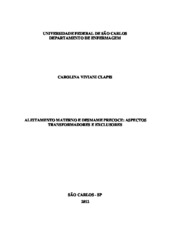Aleitamento materno e desmame precoce : aspectos transformadores e exclusores
Abstract
It is known by the entire scientific community the recommendations of the World Health Organization (WHO) on breastfeeding, ie, all babies should be breastfed exclusively with breast milk from birth to age six months and after this period, children should continue to be breastfed, along with complementary foods up to two years or more. However, research confirms that Brazil is still below the level recommended by WHO, ie, we have in alarming prevalence of early weaning in our capitals and the Federal District.Thus, early weaning is the focus of our study, being considered as the complete interruption of breastfeeding before six months of baby's life. The aim of this study was to identify with women who weaned their children early, transformers and exclusores aspects of breastfeeding and early weaning. The theoretical and methodological framework was composed of Dialogic Learning, Feminism and Methodology Dialogical Communicative Critique. This is a qualitative study, conducted in various districts of the city of Itirapina / SP in the period 2010 to 2011. Participants were 12 mothers who weaned their children early, before six months old infant and has not passed three months of weaning due to possible oblivion information. Data were collected from questionnaires, interviews, field diary and discussion group communication. The socioeconomic profile of the mothers collected from questionnaires were analyzed using the program Microsoft Office Excel 2007 and qualitative data from the basic level of analysis proposed by the Communicative Method, pointing out the aspects transformers and obstacles in the experience of breastfeeding and weaning early. The socioeconomic profile of the mothers were: young people, aged 20-29 years, married (42%), the majority had completed secondary technical education (59%), most of the mothers worked outside the home (67%) and were primiparous (75%). The qualitative results allow us to conclude that maternal employment and labor laws were exclusores factors, the understanding that the nipple protrusion is essential for breastfeeding was also an aspect exclusor, but it deserves further study. The identification of increased financial expenses of the family with weaning was transformative capacity for reflection and highlights of the mothers, breastfeeding is a practice socialized since childhood highlights the biological character, but the affinity for the breastfeeding rescues the right to make choices and be respected for being different. The pleasure in breastfeeding was the function of being submissive mother and give up this feeling and "take the pain" for the health of the child. Such perceptions make us reflect how society loses by not listening, silence voices and even judge the proposals of the mothers rather than trying to make sense of them.
